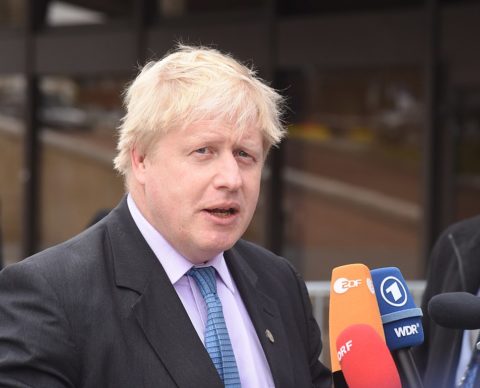In The Critic, Robert Hutton explains why so many members of the British press find Waugh’s satire of their trade so compelling:

Boris Johnson, Secretary of State for Foreign and Commonwealth Affairs at an informal meeting of the Foreign Affairs Council on 15 February 2018.
Photo by Velislav Nikolov via Wikimedia Commons.
For a British reporter, Scoop is the holy text of the job. One of the enduring mysteries of journalism is that a trade which employs large numbers of skilled writers, and puts them into interesting situations every day, has been the subject of so few really good novels. Scoop was written as satire, but eight decades after it was published, and after the industry has gone through two technological revolutions, it remains the best description of UK journalistic life.
While parts of the job have changed — copy is no longer filed in an abbreviated telegramese to reduce transmission costs — much remains the same. Anxious newspaper executives still live in terror of capricious proprietors. Reporters still enjoy a strange fellowship of simultaneous competition and cooperation. Entertaining readers remains as important as informing them.
So how does the current British PM fit into all of this? Well, Boris had been a journalist:
Which brings us to Boris Johnson. As well as being Britain’s most successful politician, the prime minister has long been one of the country’s highest-paid journalists, a job he did entirely in the Scoop mould. His sympathetic biographer, Andrew Gimson, describes how, posted to Brussels, Johnson delighted in producing stories that were more entertaining than accurate. It was not that he was opposed to writing accurate stories, but he didn’t see it as in any way essential.
The Scoop character Johnson most resembles isn’t the hero — Boot is too naïve, his reports too close to reality. Nor is the press corps regulars, Corker, Shumble, Whelper and Pigge, who huddle in the same hotel, lest they will be beaten on a story. Johnson, both as journalist and politician, has generally preferred to hunt alone. We must look to the man Boot replaced at the Beast, foreign correspondent Sir Jocelyn Hitchcock.
Like Johnson, who was hazy on the outcome of the Battle of Stalingrad, Sir Jocelyn is more confident than he should be about history (“He was wrong about the Battle of Hastings,” says Lord Copper. “It was 1066. I looked it up”). He hides in his hotel room before filing an entirely imaginary interview — something else for which Johnson has form. Sir Jocelyn was, pleasingly, modelled on Sir Percival Phillips, a correspondent for the Daily Telegraph, which would later employ Johnson.
Sir Jocelyn’s fabrications didn’t hold him back, and Johnson’s propelled him to the front rank of journalism, then into politics, where he exhibits the same behaviour: the pursuit of a higher “truth” unburdened by facts, the deadline mentality, the reluctance to correct mistakes, the assumption that someone else should pick up the bill. Johnson was neither the kind of journalist nor a prime minister who would read a study on, say, pandemic preparedness. A leaked document from his first months in the job showed him describing Cameron as a “girly swot” for wanting to show that MPs were hard at work.



